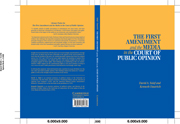Book contents
- Frontmatter
- Contents
- List of Tables and Figures
- Preface and Acknowledgments
- 1 Freedom of the Press and the Power of Public Opinion
- 2 Surveying the Public on Press Freedoms
- 3 What Americans Know About the Freedom of the Press
- 4 Public Support for the Freedom of the Press
- 5 Support for Press Freedoms Across Media: Comparing Print, Electronic, and the “New Media”
- 6 Support for Press Freedoms within a Medium: Elite, Mainstream, and Tabloid News Sources
- 7 Public Opinion, the First Amendment, and the Challenges of the Twenty-First Century
- Appendix: Annotated Questionnaires
- References
- Index
1 - Freedom of the Press and the Power of Public Opinion
Published online by Cambridge University Press: 05 June 2012
- Frontmatter
- Contents
- List of Tables and Figures
- Preface and Acknowledgments
- 1 Freedom of the Press and the Power of Public Opinion
- 2 Surveying the Public on Press Freedoms
- 3 What Americans Know About the Freedom of the Press
- 4 Public Support for the Freedom of the Press
- 5 Support for Press Freedoms Across Media: Comparing Print, Electronic, and the “New Media”
- 6 Support for Press Freedoms within a Medium: Elite, Mainstream, and Tabloid News Sources
- 7 Public Opinion, the First Amendment, and the Challenges of the Twenty-First Century
- Appendix: Annotated Questionnaires
- References
- Index
Summary
The press in the United States has become a modern-day whipping boy for frustrated citizens. Its detractors are many and its supporters are few. According to one recent survey, Americans trust newspaper reporters to tell the truth only slightly more than they trust either politicians or lawyers to do so. Nor does the public think much of journalists' ethical standards, ranking them on a par with those of elected officials, attorneys, and corporate executives. Spurred by the growing chasm that has developed between members of the communications media and the public, legal experts have begun to predict dire consequences for Americans' First Amendment rights (see, e.g., Richards, 1998; Sanford, 1999). One commentator has even argued that the First Amendment as a whole is “more under siege now than ever before in this country's history” (Richards, 1998:1). Such doomsday talk assumes that the public's lack of confidence in the media translates readily into weakened support for freedom of the press.
This book approaches the problem of public dissatisfaction with the media from an entirely different perspective. Specifically, we argue that public sentiment toward press freedoms is not as fragile as many scholars suggest. Certainly the relationship between the public and the media promises to remain a complicated one for the foreseeable future. As always, popular support for the press as a whole is a product of the current political environment, as well as various historical, social, and pragmatic considerations.
- Type
- Chapter
- Information
- Publisher: Cambridge University PressPrint publication year: 2002



